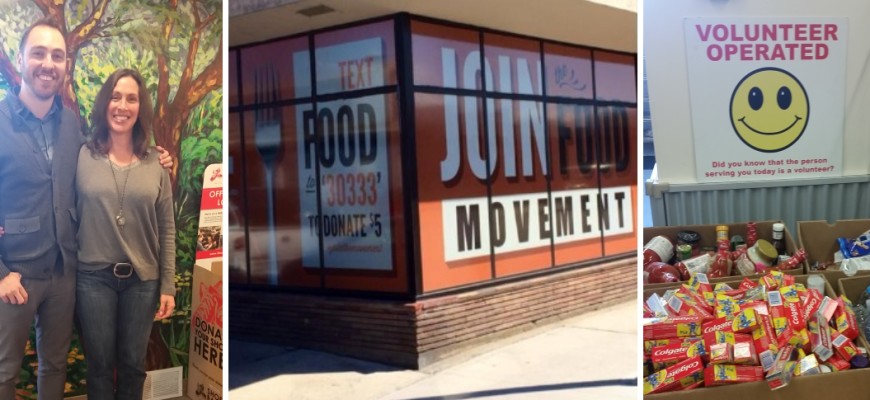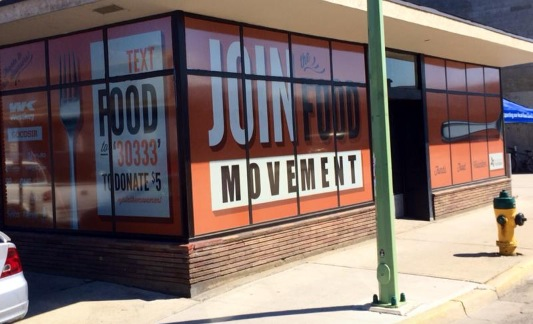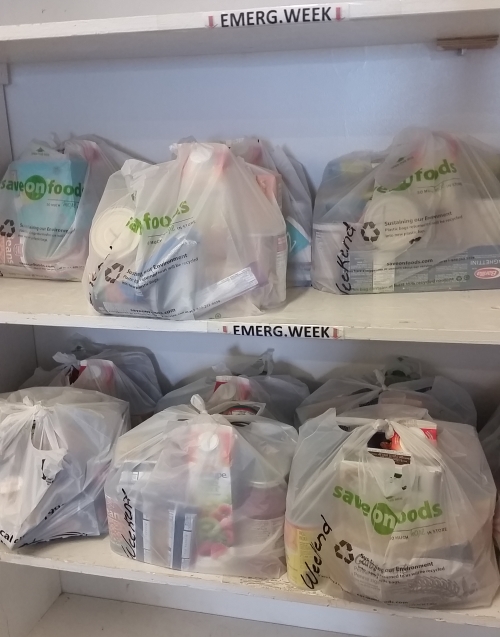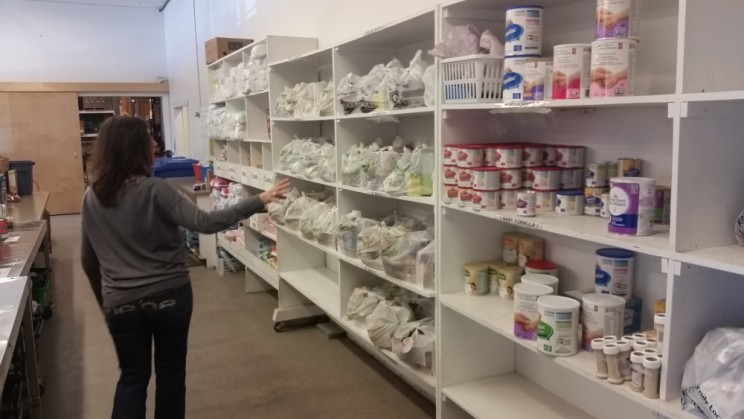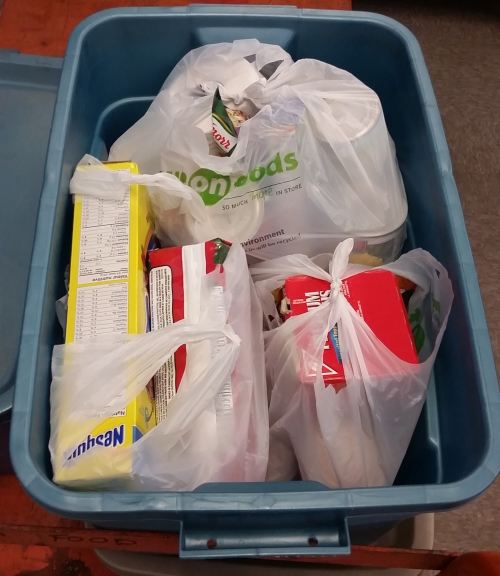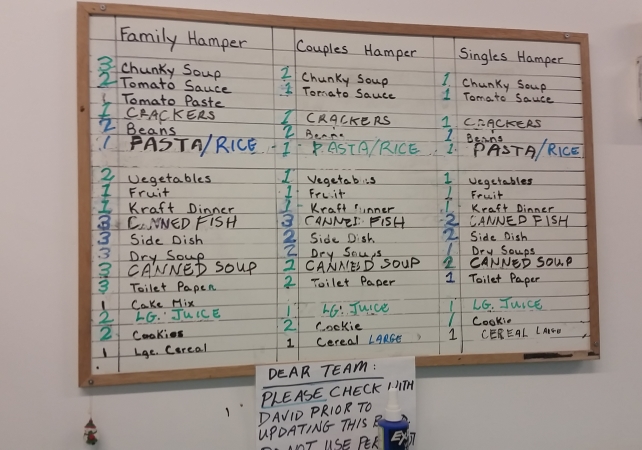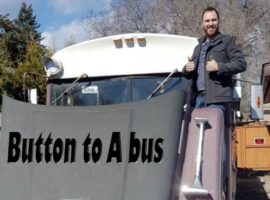Doing this month’s budget challenge has been an eye opening experience to say the least. The struggle of being hungry and not having an option to go out for a quick easy meal has really made me think about how much we take that luxury for granted. If I’m at work or across town on my bike and I haven’t eaten for a while I have no choice but to wait until I can bike home (which makes me more hungry) so I can make myself a home cooked meal. Even portion sizing my meals is often difficult; as I scoop exactly one cup of veggies into my steamer I look at them thinking ‘that’s not enough…’ but I know it’s all I can afford.
I’ve thought about this issue of food scarcity a lot over this month. ‘If dealing with budgeting and spending was this difficult for someone like myself, imagine how challenging it would be for someone who didn’t have the resources and prior education that I had. Imagine what someone with a disability or an addiction (even just smoking) would go through, or imagine what a single parent who had to feed themselves and their children would go through just to survive.’
I felt drawn to explore these questions further. I wanted to know more about who these people were and how they managed to survive in this challenging world everyday. I reached out to our local FoodBank in hopes of finding some answers. What I found was so much more.
Expectations and Reality
Honestly up to this point when I thought of the FoodBank my first thought was somewhat negative. I imagined a depressing place where homeless or low income people would go to get free food. It seemed like a necessary service but also a crutch that kept people living off the system.
Through a friend I connected with Fraser Campbell who was the Chair of the Central Okanagan Community FoodBank. After explaining my budget challenge and my exploration of food scarcity he kindly set me up a meeting with Lenetta Parry and David Purdon who were the FoodBank’s Executive and Assistant Executive Director’s respectively.
When I arrived for my meeting things looked pretty hectic. I saw people checking in and out with their food hampers, workers running around sorting and distributing and a small office of individuals trying frantically to keep everything organized. David was one of the latter individuals and looked to be right in the middle of something important when I introduced myself. He apologized for being preoccupied and suggested I take the “I had no idea” tour with Teri Kanner before we talked.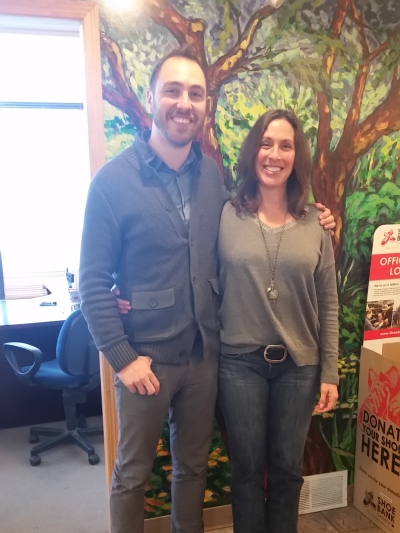
I wasn’t sure what the “I had no idea” tour was but when I met Teri I was quickly educated.
Teri was new to the Foodbank, only having worked there a couple months but her passion and excitement for the work she was doing seemed to influence everyone around her. She took me through every aspect of what the FoodBank did and why she felt it was so important.
What I experienced was so far removed from my depressing and negative predisposition that I actually felt ashamed to admit it.
The Foodbank was full of amazing, positive, passionate people who were all volunteering their time to help those in need. The individuals they were helping were just regular people that for one reason or another were struggling to survive and needed some help. The Foodbank wasn’t just handing out food they were offering a lifeline to those in our community that needed it most.
I Had No Idea
Taking Teri’s tour I discovered so many surprising things about the FoodBank that I feel most people like myself had simply no idea of. Here are just a few I would like to share.
- 4000 people use our local FoodBank monthly, with 60 new households signing up every month. 33% of clients are children under the age of 15.
- The Foodbank runs breakfast programs for children at schools across the Okanagan to assure kids that couldn’t otherwise afford it can get a good healthy meal to start their day.
- Very few people who use the FoodBank come their by choice. 30% are on social assistance and 70% are considered “working poor.”
- The working poor could be a single parent who is struggling to support their family, a senior citizen who’s pension doesn’t provide enough on which for them to survive, or a person on disability who can’t work and who’s government subsidy is too little to afford housing and food.
- You have to have a residence to use the FoodBank.
- The Foodbank doesn’t directly support the homeless but they do have a referral network of other community programs that can.
- You can only use the FoodBank once per month.
- The hampers are meant to be a hand up not a hand out. They supply a weeks worth of food as an emergency fund for those that need the support.
- They are not government funded and rely solely on the support of the community.
- Donations are essential for keeping their services going. Each donation goes to supporting their delivery programs, fundraising, utilities and building maintenance, equipment maintenance, and administration.
- The FoodBank provides perishable as well as non-perishable items.
- They even provide specialty support to people with dietary issues (celiac, vegetarian, lactose intolerant) or mothers that need diapers and formula for their children.
Chatting with Passionate and Inspiring People
During Teri’s tour my perspective on who the FoodBank was and what they did for the community had completely been turned upside down. I met so many amazing people with positive stories from seeing people turn their lives around and themselves getting back on their feet. I was feeling inspired and I wanted to know more.
I sat down with Lenetta to discuss the challenges of running such a large scale and delicate operation. She admitted that although she felt like they were making an impact she knew that they needed to do more. Because of the limitations of their old building they could only serve a certain number of individuals each month and unfortunately the demand for support was only getting higher. Lenetta’s dream was to be able to move into a new larger facility where they could not just house more donations but where they could run other social assistance programs. She hoped to one day have a commercial kitchen where they could provide cooking lessons and a community garden where people could grow their own produce instead of having to rely on community donations.
Lenetta saw the FoodBank as the cornerstone of support for food scarcity and wanted to not just provide a short term solution to the issue but to work on solving the root problems. She aspired to help the local government provide more affordable housing and better skills and job training for low income individuals helping people break the cycle of poverty and begin to better themselves. Unfortunately the FoodBank like many non-profits was constantly challenged by funding and awareness issues that stalled her aspirations from moving forward.
Currently Lenetta and the FoodBank were just in the process of implementing a new computer system that had been years overdue. This system was supported by FoodBanks Canada and would help to better track clients usage and pain points. With this new system they could now identify why individuals used the FoodBank, how often they returned to need assistance and what areas of social support were the most important to focus on. Although many challenges still laid ahead Lenetta was very positive about this program as it could be the first step to discovering and fixing the root problems that the FoodBank was trying to solve.
When I finally met with David I was beyond energized and eager to dive deeper into my questions about why people used the FoodBank and how they managed to survive even with their support. Rather than answer my questions directly David suggested I speak with one of their volunteers who was struggling with these very challenges right now.
David introduced me to a single mother of two who was not just supporting her family on less than $200 per month but was also a volunteer at the Foodbank and currently working at putting herself back through school. I was both humbled and inspired by her amazing story of heartbreak and perseverance. She agreed to share her story in more detail and we set a time to sit down again soon.
I left the FoodBank with a new understanding of how food scarcity affects and connects our community. My budget challenge was no longer just about me and my own personal development but now about something much greater. It’s my hope that by reading this article that you will challenge your own dispositions about your local FoodBank, what role they play in the community and the people that they support that are struggling just like you and I to scale their lives.
